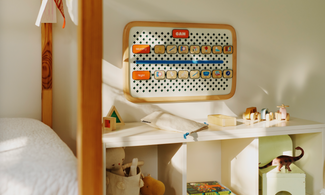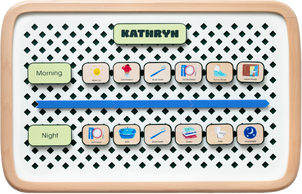The Importance of Routine in Early Childhood

Imagine waking up in the morning and having absolutely no idea (and very little control over) what was going to happen in your day. You might wonder things like: When will I eat? What time will I work? Who will I see? It would be disorienting and a little scary. Without routines, this is what the day feels like for young children. Routines, which are a predictable sequence of events, serve as anchor points that help children recognize patterns and understand what is currently happening and what is going to happen in their day.
In early childhood, routines have countless benefits. Here are a few:
Safety and Stability
Before children can play, learn or connect they have to feel safe. Since the concept of time is abstract for children, they are often left wondering when their wants and needs will be met. This uncertainty can cause anxiety and fear. Routines provide structure and predictably so children have the comfort and confidence needed to explore their world. To help children process and make sense of their routines, visual tools like the Springboard remove abstraction and make events in the day accessible and concrete.
Create Adaptability
You might be wondering, “won’t routines make my child inflexible?” Actually, it’s just the opposite! As we shared before, routines help children feel safe and in the know. When children feel secure, they are more willing to be flexible and are able to adjust to curveballs because they feel confident that they have a solid foundation to return to.
Encourage Independence
“I do it myself!” is a phrase most parents have heard more than once. Children crave independence and predictable routines set expectations, which means kids can move through the day with more control and less intervention (aka constant reminders!). To encourage independence, turn to the Springboard to break down transitional moments in the day, like bedtime or the morning getting-ready process, into specific, familiar steps. This makes the routine tangible and allows children to independently complete each step, which promotes mastery while making the day a whole lot smoother for everyone.
SEL Building Blocks
Unlike strict schedules, which can feel constraining and cause anxiety, routines offer a framework (not a prescription!) that allows children to anticipate and predict what comes next. This helps them to navigate tricky transitions like cleanup time with fewer tantrums and more ease because they aren’t surprised. Plus through routine they build social and emotional skills like confidence, impulse control and self-regulation.
Get Everyone on the Same Page
Do you ever feel like you’re the timekeeper for everyone in your family? When children don’t know what to expect they can become dependent on looking to you for every detail about their day. The Springboard helps everyone get on the same page by showing what is going to happen and when. This means less nagging for you and more independent problem-solving opportunities for them.
